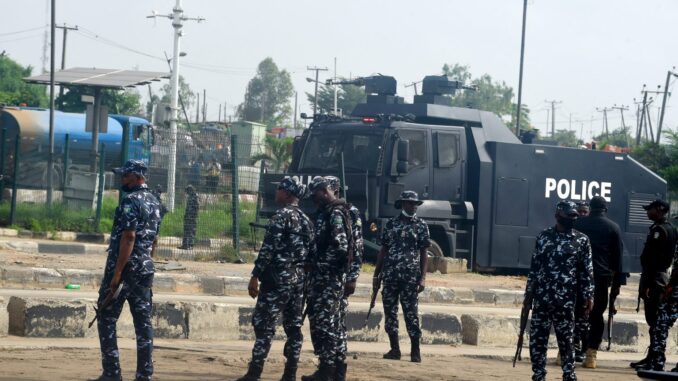
Disclosure by Lagos State Governor, Babajide Sanwo-Olu that the state spent N3 billion on the police force is yet another pointer to the need for decentralisation of the police institution that can keep pace with the modern trend of law and order. The disclosure also supports the need for the establishment of State Police in the country. It means that although governors have no direct control of the police, being a federal establishment, they are nonetheless funding it and making it functional. The argument, in some quarters, against state police is therefore wrong-headed in view of the fact that states that do not own the police institution are bearing the huge cost of equipping the police. It is also apparent that the Federal Government that constitutionally owns and controls the police is not giving it sufficient funds. This is paradoxical and confounding.
Sanwo-Olu, the other day, disclosed that the state spent over N3 billion to equip the Nigeria Police in 2021 in its quest to ensure the safety and security of residents. The Lagos governor’s expenditure is just one out of what the various state governments spent during the same period that runs into billions. Sanwo-Olu who made the disclosure at the 15th town hall on security by the state government, organised by the Lagos State Security Trust Fund (LSSTF) with the theme, “Re-conceptualising Safety and Security in Lagos State,” maintained that the government would continue to play a leading role to secure the state, adding that the state had demonstrated commitment in the past and will remain resolute in the quest to enhance peace and security.
Although the amount being spent by Lagos State Government, and indeed other states, to keep the police afloat is huge, no amount is too much to ensure safety of lives and property. The crucial question is whether Lagos State is getting the benefit of its expenditure. Sadly, that question can only be answered in the negative. Despite the huge financial outlay on the police, the state still faces numerous security issues that keep it away from its aspiration of being a mega city.
For Lagos to lay claim to a modern city, it must be rid of the crass lawlessness that is currently its lot. The truth is that police presence is almost nil in the state, save for those on duty at checkpoints, mainly interested in vehicles with incomplete or faulty particulars. Since #EndSARS protest late 2020, the police have not been able to recover their confidence; and this is a huge blow in a sprawling city as Lagos where people troop in daily in their thousands, with many of them seeking to hike a living by hook or crook.
The Lagos State Commissioner of Police, Hakeem Odumosu, more or less confirmed the poor motivation of the police when he stated that 2021 posed a huge security challenge with the #EndSARS protests, although he noted that the state did not record any attack on any bank. But insecurity in the state is signposted daily by criminal activities of commercial motorcyclists or okadas, as well as street urchins and area boys. Traffic robbers still have a field day anywhere and anytime traffic builds up particularly in the evenings after dark. People are daily dispossessed of their personal belongings especially phones whenever the bad boys decide on an operation. Most of the time, no one is apprehended. And very often, the police are simply overwhelmed by the enormity of the problems compared to their own limitations in number and in equipment.
In addition to supporting the federal police, many state governments have also created various security outfits with different names, all in a bid to safeguard lives and properties of citizens. One such outfit is the Lagos State Neighbourhood Watch (LSNW) which, though not armed, performs the functions of the police. Without these agencies and support of the various state authorities, the police institution, as it were, would be unable to cope with the worsening security challenges confronting the country. Even at that, the huge expenditures of the state have not resulted in commensurate result in curbing insecurity and protecting lives and properties.
Over the years, state governments have been supporting and equipping the police. In the case of Lagos, N3 billion in one year is huge; and the state deserves to get good results from such expenditure. Unfortunately, the governor has no direct control even on how the equipment and other support are utilised. Why then are some people against state police? Why should the states not be allowed to have their own police outfit on the ground that he who pays the piper dictates the tune?
It is regrettable that the police have been rendered largely ineffective over the years. There is concern that the number of policemen on roll is grossly inadequate. For instance, not long ago, a former Inspector General of Police (IGP), Mike Okiro, disclosed in Benin, Edo State, that there were 377,000 policemen in the country. This is against the projection by pundits who maintain that the country needs not less than a million police officers to man a country of about 200 million people.
Despite the acute shortfall in the number of policemen, politicians, businessmen and anyone who could afford to pay the price are assigned police guards. Some powerful individuals go to the extent of having a retinue of policemen in their homes and convoy. This is a sad commentary on the security situation in the country as armed robbers, bandits, ritualists, kidnappers and sundry criminals have become bolder in perpetrating criminality all over the country.
As a mega-city and melting pot of Nigeria’s business activities, Lagos should redouble effort to make the state safer and habitable. Regular huge donations to the police are not the answer. For a start, it should become more involved in campaign for realisation of state police in the country.
END

Be the first to comment